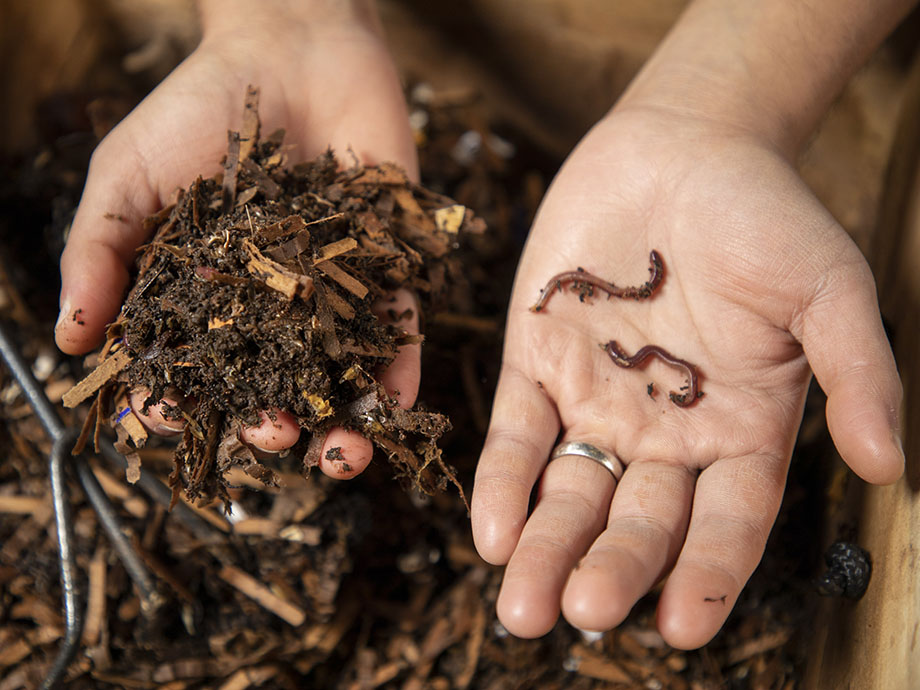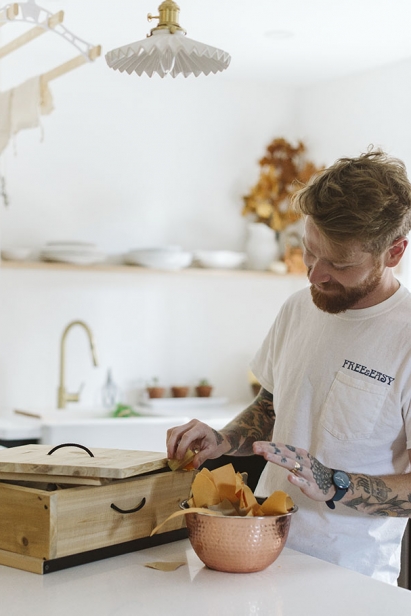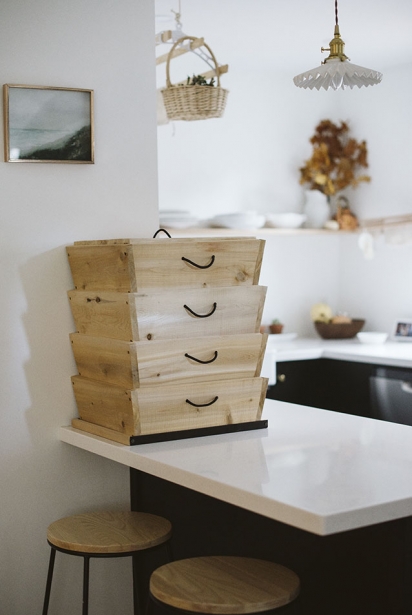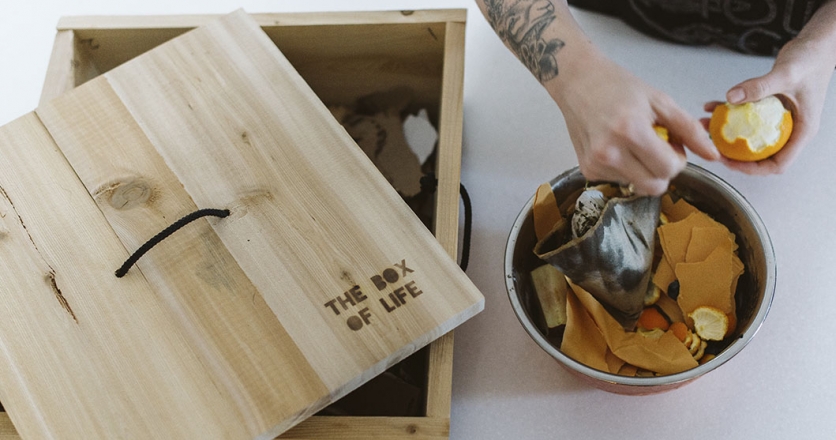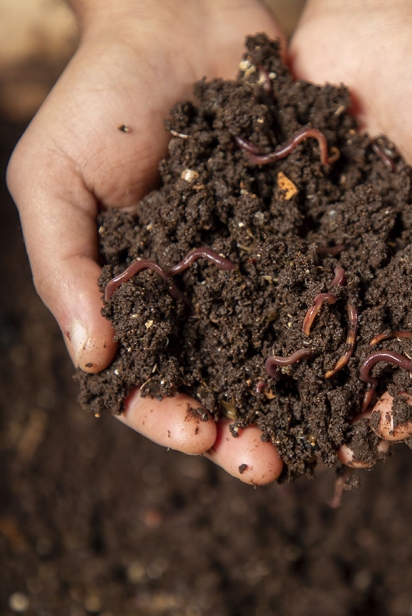Changing the World, One Worm at a Time
Akil Mesiwala has a simple yet beautiful stack of cedar boxes in his home that house a most unusual pet. Inside “The Box of Life” he keeps between 1,000 and 2,000 red wiggler earthworms.
Although Mesiwala feeds and cares for these pets and thinks of them affectionately, they are working animals. They have an important job in his home, with positive ramifications across the community. Over the course of a week, they can eat through two to five kilograms of food scraps. As they munch, they move up to the next box and another fresh layer of food, leaving behind them their castings, which make a most fertile compost.
This indoor composting solution is ideal for those living in small spaces. As only vegetable scraps should be used and the worms efficiently process them, the “worm studios” do not emit any nasty aromas at all and, in fact, have a pleasant earthy smell.
Mesiwala is originally from Mumbai, India, and relocated to North America to study renewable energy systems in Boston, before settling in Ottawa in 2018. His interest in sustainability led him to experiment with home composting before launching his vermiculture business, The Box of Life, in 2019.
“I got started with a handful of red wiggler earthworms in a plastic container. The worms survived and I realized it was such an easy process. I’m really passionate about sustainability and I believe compost can change the future of how we treat waste. So, I started working on it as a passion project and that’s how The Box of Life came to be.”
Mesiwala creates his vertical worm migration systems using cedar and they stack one on top of another either in towers of three or four. The worm studio comes flat packed and needs to be assembled, but Mesiwala assures new customers that it’s a very simple process that only requires a screwdriver to get up and running.
Once assembled, you’ll need to add your worms, but don’t head out into your garden to collect any old annelids, you’ll need special composting earthworms, either red wigglers or European nightcrawlers, which you can purchase from local dealers or directly from The Box of Life.
Each cedar box has a mesh bottom allowing the worms to travel up towards fresh food scraps. Once the wiggly critters reach the top box, the bottom box will be ready-to-harvest fresh compost. This process takes about three to four months. The worms don’t need to be replaced, and just like in nature, will reproduce until you even have enough to share with others starting out.
Mesiwala recommends you start with a half pound of worms and feed them slowly with a vegetarian-only diet. When you purchase a worm studio, you’re creating an entire ecosystem, it’s not a garbage can. That means no dairy, no meat and a dose of patience, particularly when you start out.
As a miniature ecosystem in your home, the worm studio provides a living, moving educational demonstration every day. Mesiwala has noted the potential to use his vermicomposting business to teach sustainability and has even begun to introduce them to schools where they act as classroom pets that also teach children about soil health and the food cycle.
“Earthworms are very practical teachers that can stay in the classroom as an educational tool, where teachers can introduce a real world composting system to not just compost scraps and build soil, but also to teach children about natural systems, about the life cycle of earthworms and incorporate science in a very practical way into their classrooms.”
Before the pandemic, Mesiwala ran in-person trainings teaching new vermiculture enthusiasts how to set up and run their worm studios. This educational component has had to move online with Mesiwala offering webinars in what he calls “vermicomposting 101.” Through these sessions, he hopes to not only impart practical tips on getting started, but also to highlight the bigger impact home composting can have.
“Composting is such a simple way to reduce your carbon footprint, to build healthy soil and to get connected to nature.”
Mesiwala’s passionate commitment to sustainability stretches across all parts of his business starting right with the construction of the worm studios. “My philosophy is zero waste. So, in my woodshop, I don’t have a trash can. I make sure that everything is used the way it should be.”
This includes an ingenious way to reuse any damaged or imperfect worm studios. Boxes with dings or edges that don’t meet exactly are given to artists to decorate before auctioning them off for charity in a project named the Ugly Worm Studio. This has resulted in some beautiful creative boxes featuring flowers, doodles and bold colours designed and adorned by local Ottawa artists.
Mesiwala didn’t start his company to simply manufacture cedar boxes, he is interested in creating a much larger community change. As a social enterprise, he wants to educate and change the way that urban dwellers think about and approach food waste and soil health.
“Our mission is to not just build products, it’s to create lifelong habits. I don’t want to just sell worm studios and have people give up on it. I want to push them to figure out all the barriers that they experience over time and find ways to overcome those barriers because I want them to use this forever.”
His future plans include moving back to in-person learning sessions and, in the long run, creating a local composting culture to address issues of food security and self-sufficiency.
“I want to create a composting learning centre where people can come into the space, interact with the systems, learn and be a part of it, like an open wormery.”
A worm studio and worm mix from The Box of Life will cost you $250, but with sustainability as a defining principle of his business, Mesiwala expects his worm studios to last for 20 years before the cedar shows any signs of moisture damage.
The investment you are making towards improving soil quality and reducing food waste in landfills, however, is exponential.
“Composting is a really easy way for us at an individual level to change our relationship with waste systemically. We don’t need fancy systems. We don’t need complicated equipment and technology. Instead, we should think about composting as a way to extract nutrients and feed our planet.”
The Box of Life
theboxoflife.com | 873.288.1148 | @the.box.of.life


